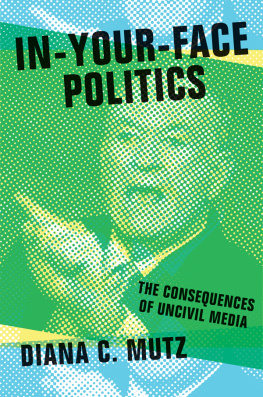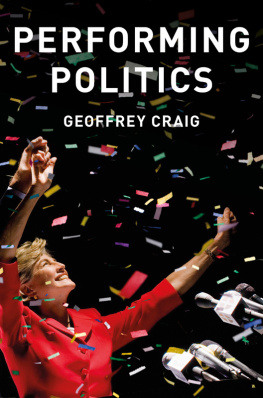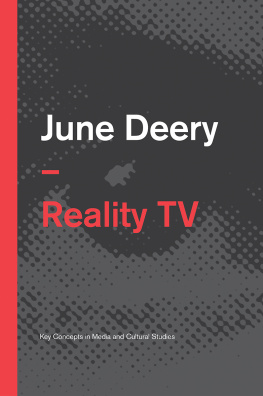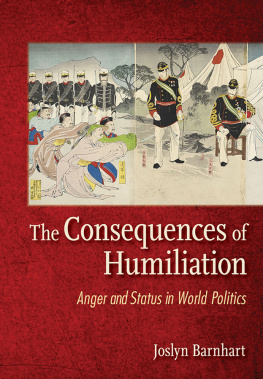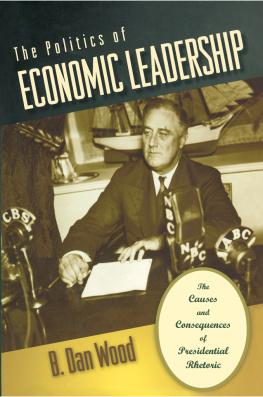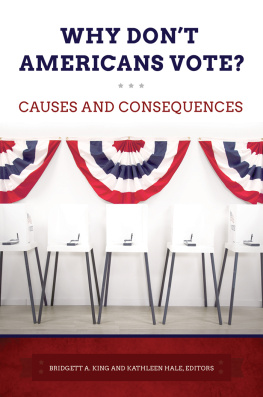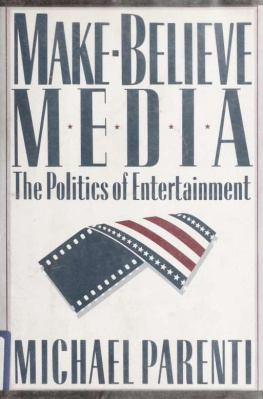Mutz - In-your-face politics: the consequences of uncivil media
Here you can read online Mutz - In-your-face politics: the consequences of uncivil media full text of the book (entire story) in english for free. Download pdf and epub, get meaning, cover and reviews about this ebook. City: United States, year: 2017;2015, publisher: Princeton University Press, genre: Politics. Description of the work, (preface) as well as reviews are available. Best literature library LitArk.com created for fans of good reading and offers a wide selection of genres:
Romance novel
Science fiction
Adventure
Detective
Science
History
Home and family
Prose
Art
Politics
Computer
Non-fiction
Religion
Business
Children
Humor
Choose a favorite category and find really read worthwhile books. Enjoy immersion in the world of imagination, feel the emotions of the characters or learn something new for yourself, make an fascinating discovery.
- Book:In-your-face politics: the consequences of uncivil media
- Author:
- Publisher:Princeton University Press
- Genre:
- Year:2017;2015
- City:United States
- Rating:4 / 5
- Favourites:Add to favourites
- Your mark:
- 80
- 1
- 2
- 3
- 4
- 5
In-your-face politics: the consequences of uncivil media: summary, description and annotation
We offer to read an annotation, description, summary or preface (depends on what the author of the book "In-your-face politics: the consequences of uncivil media" wrote himself). If you haven't found the necessary information about the book — write in the comments, we will try to find it.
Mutz: author's other books
Who wrote In-your-face politics: the consequences of uncivil media? Find out the surname, the name of the author of the book and a list of all author's works by series.
In-your-face politics: the consequences of uncivil media — read online for free the complete book (whole text) full work
Below is the text of the book, divided by pages. System saving the place of the last page read, allows you to conveniently read the book "In-your-face politics: the consequences of uncivil media" online for free, without having to search again every time where you left off. Put a bookmark, and you can go to the page where you finished reading at any time.
Font size:
Interval:
Bookmark:

IN-YOUR-FACE POLITICS
IN-YOUR-FACE POLITICS
THE CONSEQUENCES OF UNCIVIL MEDIA
DIANA C. MUTZ
PRINCETON UNIVERSITY PRESS
PRINCETON AND OXFORD
Copyright 2015 by Princeton University Press
Published by Princeton University Press, 41 William Street, Princeton, New Jersey 08540
In the United Kingdom: Princeton University Press, 6 Oxford Street, Woodstock, Oxfordshire OX20 1TW
press.princeton.edu
Author photo courtesy of the Annenberg School for Communication
All Rights Reserved
ISBN 978-0-691-16511-0
Library of Congress Control Number: 2014956135
British Library Cataloging-in-Publication Data is available
This book has been composed in Folio Std & Sabon Next LT Pro
Printed on acid-free paper
Printed in the United States of America
1 3 5 7 9 10 8 6 4 2
DEDICATION
To BS,
and
the era
of chaos
ILLUSTRATIONS
TABLES
ACKNOWLEDGMENTS
This project has occupied my attention intermittently over a long period of time, starting out when I was on sabbatical at the Center for Advanced Study in the Behavioral Sciences. With the luxury of additional time on my hands, I decided to pursue a much more ambitious plan for developing stimuli for a new series of experiments. Instead of using existing media content and the relatively poorly controlled stimuli it would create, I produced my own political talk show in order to obtain high levels of control over the experimental stimuli, the shows content, and its presentation. Doing so led me back to my undergraduate days as a radio, television, and film major at Northwestern University, where I learned how to edit film (with scissors and tape!), how to direct a multicamera shoot, and how to cut from one shot to another. Although the technology was different, the principles remained the same.
For encouragement and expertise when first embarking on this project, I thank Byron Reeves of Stanford University. Byrons research served as the inspiration for many of these studies, and he was instrumental in getting the ball rolling, as well as helping with the production of stimuli, which occurred in a professional television studio in the basement of McClatchy Hall. Although the candidates were paid professional actors hired for this occasion, my old friend and mentor Don Roberts served as unpaid talent for this production by playing a Phil Donahue look-alike who moderated the candidate exchanges. Neil Smelser, Bob Scott, and Gardner Lindzey from the Center for Advanced Study served as inspirations for the two fictitious candidates used in the original experiments (Neil Scott and Bob Lindzey).
I have many graduate and undergraduate students at several locations to thank for their help with running experimental subjects, managing my lab, and analyzing data. At Ohio State University, Brandon Bartels, Andrew Holbrook, and Justin Taylor served as research assistants on the earliest experiments. At the University of Pennsylvania, Andrew Daniller, Susanna Dilliplane, Danielle Dougherty, Seth Goldman, Shiloh Krieger, Kelli Lammie, Elaine Miller, Jason Miller, Laura Silver, and Lori Young each contributed to some portion of this project. Without their time, their commitment to detail, and their delightful companionship, this project would never have succeeded.
At Penn I have benefitted from the support of too many colleagues to mention individually, in both the Department of Political Science and the Annenberg School for Communication. Nonetheless, I particularly want to thank Sharon Black, Kyle Cassidy, and Joe Diorio for their willingness to provide many kinds of support throughout this project. For funding support, I thank the National Science Foundation and the Center for Advanced Study in the Behavioral Sciences, as well as the Institute for the Study of Citizens and Politics at the Annenberg Public Policy Center. Finally, I also thank Eric Crahan and his team at Princeton University Press for making production of this book as quick and painless as humanly possible.
Some of the ideas in this book have appeared elsewhere in their early stages. For example, in How the Mass Media Divide Us, an essay I wrote for the Brookings Institution volume titled Red and Blue Nation? (edited by David Brady and Pietro Nivola), I suggested the potential for media to produce a more divided public. I informally described these effects in an essay titled Television and Uncivil Political Discourse in Can We Talk? The Rise of Rude, Nasty, Stubborn Politics (edited by Daniel M. Shea and Morris P. Fiorina). Some of the empirical findings were also published as articles in the American Political Science Review.
But most of the studies in this book have been slowly accumulating over the years, with my ideas on in-your-face politics evolving as the media environment has experienced a period of extremely rapid change. The tension between the need for larger audiences for political media content and the need for productive political discourse make this a formidable problem that is not likely to disappear anytime soon.
Finally, to my family, Robin, Walden, Maria, Simi, and the critters too many to mention by name, I thank you all for the many distractions that make everything worthwhile.
Diana C. Mutz
Philadelphia
IN-YOUR-FACE POLITICS
CHAPTER 1
WHAT IS IN-YOUR-FACE POLITICS?
It was March 2003 and my mother-in-law was visiting from Berkeley. I was watching George W. Bush speak to the nation about the impending war with Iraq. As she walked into the room, she turned her head away from the television in disgust. Aach! she exclaimed, I cant bear to have that man in my face. It makes me sick to my stomach! Of course, the president was not actually in her face, he was speaking to us from Washington, D.C. But as I watched, the images to a significant extent bore out her impression. For the next twenty minutes, I viewed George Bush from a far more intimate, close-up visual perspective than I had viewed my own family across the dinner table. His face often filled the entire television frame, so much so that the top of his head was cut off. To obtain the same visual perspective in person, my mother-in-law would need to be either his lover or his dentist. Given her politics, the mere thought of being that close probably did make her sick to her stomach. While I initially had considered her statement a display of political histrionics, when viewed from this perspective it seemed far more plausible that she might have such a visceral reaction.
Television gives us a unique visual perspective on other human beings, one that is far more intimate than we are accustomed to having with strangers in everyday life. But I had not previously thought about the consequences this might have for how we react to politicians and politics. As a film student in college, I learned to use the close-up camera shot to create a sense of emotional intensity in films: but do we really want that kind of intimacy with our politicians? In face-to-face social contexts, there are strong social norms guiding the distance we put between ourselves and other people, particularly people with whom we disagree. Do televised interactions follow these same rules? Apparently not. Instead, televised political interactions often violate face-to-face social norms for social distance by producing the appearance of being close to viewers. Television simulates a lack of physical distance between us and them and thus violates some deeply ingrained social norms involving spatial distance.
The fact that viewers visual perspective on politicians is now commonly in your face, in the sense of the spatial closeness that television conveys to viewers, is only part of the story. Television is also in your face in a second respect. Political discourse on television regularly violates norms for polite conversation. Complaints about uncivil political discourse on television are by now so widespread that incivility goes almost unquestioned. It is obvious to most Americans that televised expressions of differences of political opinion do not follow the usual face-to-face social norms of American culture. As young viewer Caitie Casey of Alma, Michigan, wrote in a letter to
Next pageFont size:
Interval:
Bookmark:
Similar books «In-your-face politics: the consequences of uncivil media»
Look at similar books to In-your-face politics: the consequences of uncivil media. We have selected literature similar in name and meaning in the hope of providing readers with more options to find new, interesting, not yet read works.
Discussion, reviews of the book In-your-face politics: the consequences of uncivil media and just readers' own opinions. Leave your comments, write what you think about the work, its meaning or the main characters. Specify what exactly you liked and what you didn't like, and why you think so.

